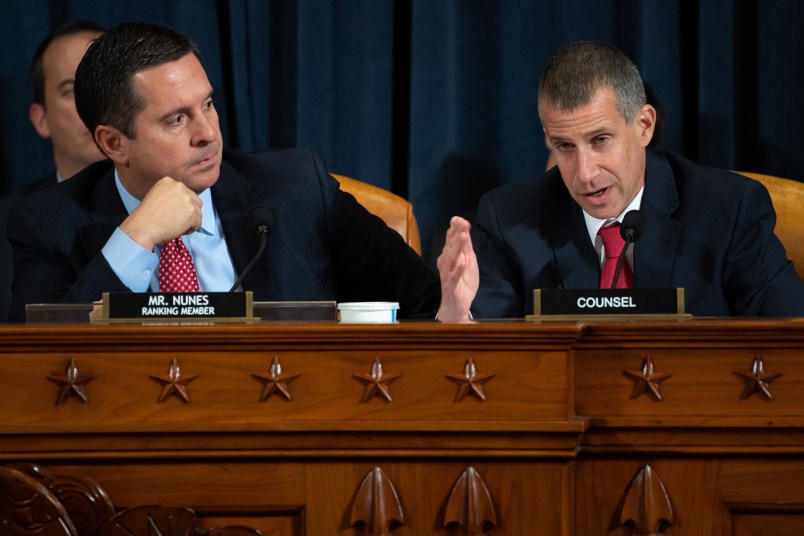House Intelligence Committee ranking member Devin Nunes (R-CA) and GOP staff attorney Steve Castor seemed to have little use for the witnesses at Wednesday’s impeachment inquiry, preferring to use their time to advance sometimes baseless assertions of which the witnesses had no knowledge.
A typical exchange between Nunes and top Ukraine diplomat Bill Taylor:
Nunes: “Fusion GPS contractor Nellie Ohr testified to Congress that Leshchenko was a source for Fusion GPS’ operation to dirty up the Trump campaign, including the compilation of the Steele Dossier on behalf of the DNC and the Clinton campaign. You testified you were unaware that Leshchenko served as a source for that project. Ambassador Taylor, is this still correct?”
Taylor: “It is, sir.”
Nunes quickly brings up the Steele dossier during his time for questioning the witnesses pic.twitter.com/D5RjA3tNL5
— TPM Livewire (@TPMLiveWire) November 13, 2019
Nunes used his time and wall-to-wall network coverage to monologue with his Fox News-esque talking points, cursorily double checking Taylor’s ignorance of the subjects he’s discussing to keep up the appearance of the questioning format.
When Castor took over the questioning, he employed much the same tactic.
“But from the President’s perspective, if the Ukrainian Ambassador to the United States, one of the most influential diplomats, is penning an op-ed, certainly with the okay of President Poroshenko, the DNC consultants are conferring with Ukrainian officials at the embassy,” Castor said. “Former Prime Minister Yatsenyuk is saying things on social media, the Interior Minister Avakov, who has spanned both the Poroshenko and the Zelensky realm, is also saying some very unkind things on social media about the President. You certainly can appreciate that President Trump was very concerned that some elements of the Ukrainian establishment were not in favor of him, did not support him and were out to get him.”
At this point, Committee Chairman Adam Schiff (D-CA) interjected — much to the Republicans’ chagrin — to “caution” Taylor about questions based on “facts not in evidence before you.”
Rep. John Ratcliffe (R-TX) jumped in, expressing his incredulity that he didn’t know he was allowed to interrupt Democratic questioning when he disagreed with the premise. Schiff waved him off and allowed the questioning to continue.
Taylor and Deputy Assistant Secretary of State George Kent appeared to have few weaknesses for Republican inquisitors to exploit. They also lacked direct knowledge of some of the obscure predicates for the the various Trumpian conspiracy theories surrounding Ukraine.
Nunes brought up the CrowdStrike theory, a convoluted fantasy that casts doubt on Russia’s hacking of the 2016 U.S. election. He repeatedly confirmed that Taylor was “unfamiliar” with many facets of the story. Earlier in the hearing, the attorney for the Democrats asked Kent about the conspiracy theory. “To be honest, I had not heard of CrowdStrike until I read this transcript on September 25th,” Kent replied, referring to Trump’s call with Zelensky.
Republicans also hammered a 2012 incident when former President Barack Obama was picked up on a hot mic telling the then-Russian President that he’d be more “flexible” to negotiate missile defense after the election. Since evidence of Russia’s meddling in 2016 surfaced, Trump allies have been trying to use the old story to draw some sort of equivalence. Once again, Taylor — who was engaged in diplomatic work in the Middle East at that time — said that he didn’t know anything about the situation.



